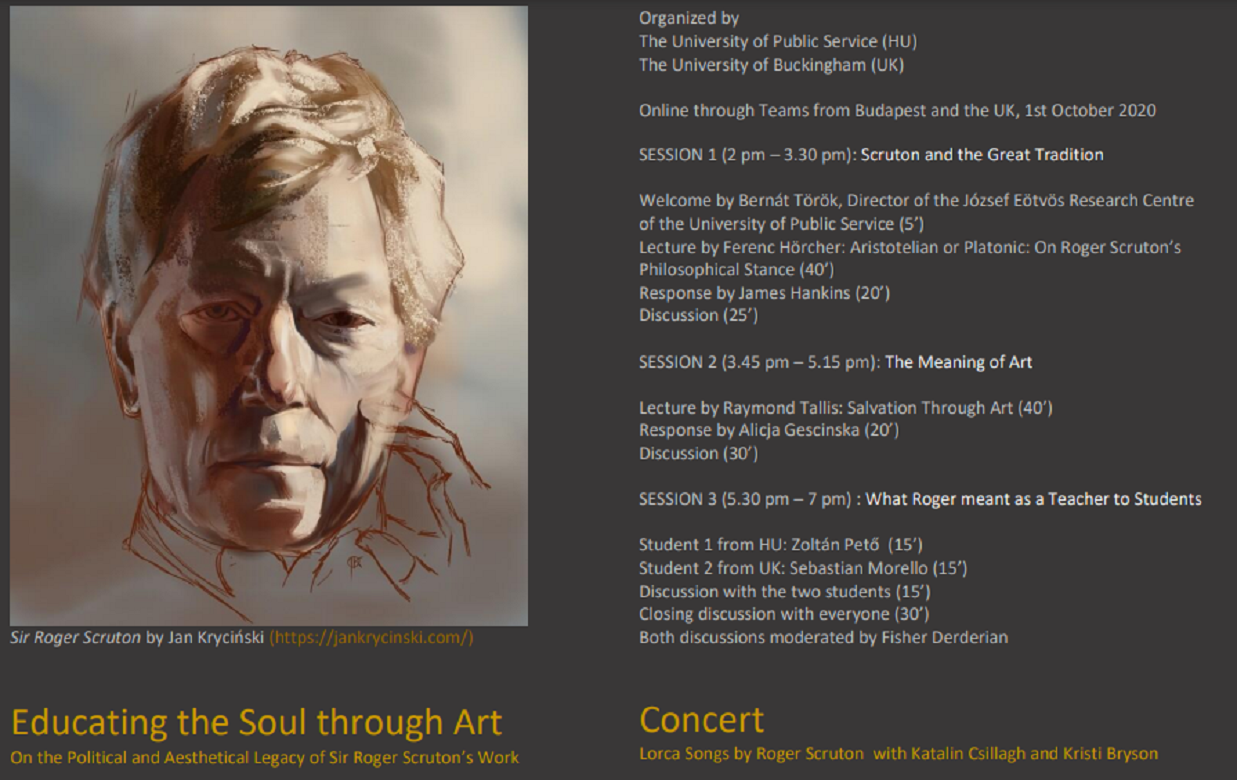![]()

- Details
- Hits: 1566
Ferenc Hörcher gives a talk at the online conference entitled Educating the Soul through Art, organised by the University of Public Service and Buckingham University.
The title of his talk is going to be: Aristotelian or Platonist? Scruton's Philosophy and the Great Tradition.
A detailed program of the conference is downloadable here.
- Details
- Hits: 1560
The Institute of Philosophy, RCH, cordially invites you to the upcoming talk
Gyula Klima (Fordham University)
Whatever Happened to Efficient Causes?
The talk will be online.
- Details
- Hits: 1694
The Department of History of Philosophy and History of Ideas
Institute of Philosophy, Research Centre for the Humanities
cordially invites you to the opening lecture of the Autumn Semester of the Research Seminar series:
Rafał Smoczyński (IFiS PAN, Warsaw)
A self-orientalizing positioning towards the European ‘core’
Working notes on making good and bad citizens in Poland
The abstract of the lecture is available here, presentation is available here.
New date: Tuesday, 15 September, 2020, 11h AM
You can join by clicking on the link below:
- Details
- Hits: 1761
The Institute of Philosophy, Research Centre for the Humanities, cordially invites you to the upcoming opening workshop of the bilateral research project of the Polish and Hungarian Academies of Sciences, entitled Westernisers and “Narodniks”. Dichotomous Identity-Generating Narratives in the 19th-20th century Polish and Hungarian Intellectual History (2020–2022). The programme of the workshop and the abstracts of the presentations are available here.
Date: Thursday, 30 July, 2020, 11h AM – 17h PM
Venue: 4. Tóth Kálmán street, Room: B.5.33
Due to the pandemic rules, registration is required by the following e-mail address:
- Details
- Hits: 1602
The Institute of Philosophy, RCH, cordially invites you to the upcoming talk
Ferenc Hörcher
Prudence, Moderation and Tradition: A Political Philosophy of Conservatism
The talk will be online.
Abstract:
This talk provides an overview of the speaker’s recently published book, entitled A Political Philosophy of Conservatism (2020). It will focus on the three concepts presented in the subtitle of the book: prudence, moderation and tradition. All the three are connected to the Ancient Greco-Roman and Christian tradition of European thought.
The last of the three terms is relatively unproblematic. It refers to the importance of communal knowledge for conservative politics, a form of tacit knowledge, a common sense, encoded in habits, customs and informal or formalised manners, including legal regulations, which is transferred from generation to generation in a given political community. The first two needs some further explanations.
Moderation will be presented as an appropriation of Aristotle’s teachings of the golden mean, as the most appropriate choice between two extremes. This idea is based in Aristotle on a theory of harmony and balance, and the paper will look at its relevance in politics. It will be argued, that Aristotle’s theory calls our attention to the balancing political role of the middle classes. Also, it will be argued that the idea of the mixed constitution is connected with this Aristotelian theory of balance and harmony (Greek armonia, lat. concordia).
Finally, the book’s most important term is prudence, referring to the cardinal virtue of prudentia (Greek phronesis). The claim is that while the virtue of justice (iustitia) is usually taken as the key concept of Christian and modern liberal political philosophy, for a conservative understanding of politics, what is possible is always more important than what is ideal. In this sense prudence precedes justice, while still keeping intact the coherence of the four cardinal virtues. In this regard the importance of Cicero for this version of conservatism will be noted. The talk will end with a description of the character of a practically wise (prudent) political agent.
Commentator: Walter Nicgorski (University of Notre Dame)
Date: 26 May 2020 (Tuesday), 2pm
You can join by clicking on the link below.
https://meet.jit.si/Filozófiai_intézet_szeminárium
The recording can be accessed via the following link:
More Articles …
- Talk by Gábor Hofer-Szabó in Barcelona
- Ferenc Hörcher participates at a session on Trust and values in a global perspective at IASK
- International Book Launch of Ferenc Hörcher's Book in Political Philosophy
- Talk by Tim Crane
- Jerusalem-Budapest twin workshop 2: Physicalism and reduction
- Talk by Ferenc Hörcher on Conservatism and Nationalism
- Panel discussion: The Future of the Humanities in a Disruptive World
- Workshop: Urban Cultures in The Early Modern Habsburg Territories
- Conference: Mental Fictionalism
Page 11 of 48


